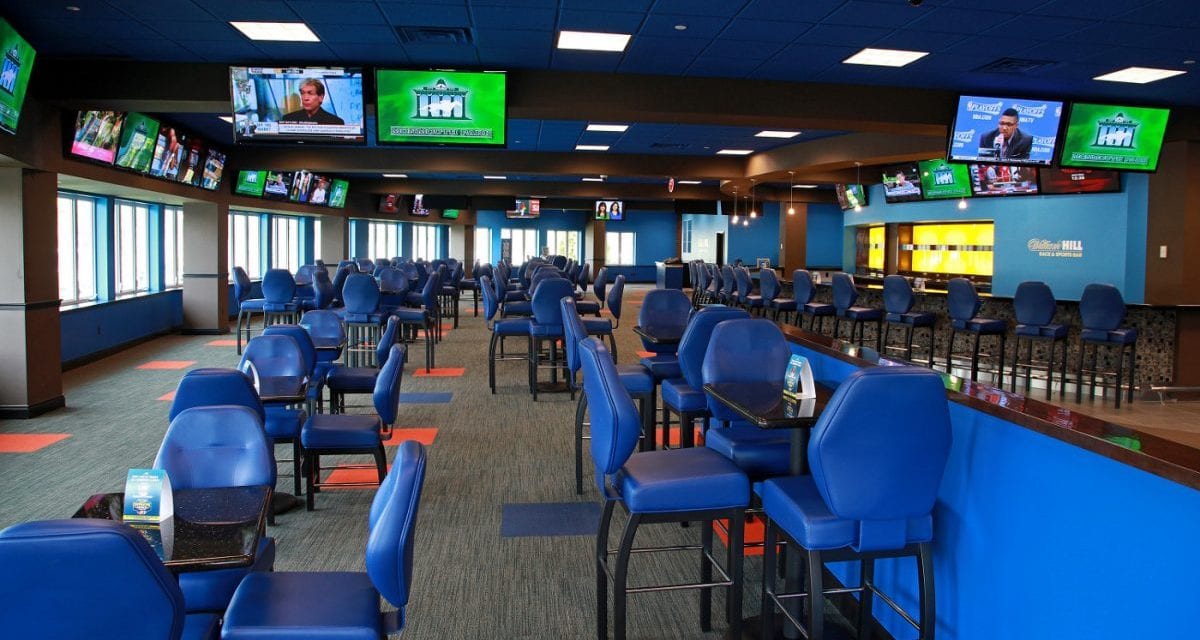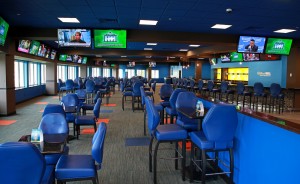by Jim Hague

Joe Asher, William Hill U.S. CEO, speaks at Monmouth’s opening press conference. By Bill Denver/EQUI-PHOTO
The plans for legalized sports betting at New Jersey casinos and racetracks took a hit in June, when the United States Supreme Court let stand a lower court ruling that federal law prevents New Jersey from permitting state-sanctioned sports betting.
However, that ruling has not stopped state legislators and lobbyists from moving forward with the plans to have legalized sports betting in place at the William Hill sports parlor in Monmouth Park by September.
Were that to happen, it would provide a significant boost to the state’s racing and breeding industry, New Jersey horsemen believe.
After New Jersey legislators tried twice unsuccessfully in federal court, the state asked the nation’s highest court to hear the issue. But last month, the Supreme Court declined to hear the case, leaving lower court rulings in place.
“It’s always a long shot to get certiorati from the United States Supreme Court,” New Jersey Gov. Chris Christie told NJ.com after the ruling. “That’s the way it goes. They said no, so we have to move on.”
However, state legislators are not giving up the fight. Just days after the U.S. Supreme Court’s ruling, the New Jersey state assembly voted 63-6 — and the Senate did so by 38-1 — in favor of a new bill that will enable sports betting to take place at New Jersey casinos and racetracks. The bill sits on Gov. Christie’s desk, waiting to be signed into law.
So what gives? How can a state law push aside a ruling by the highest court in the country?
New Jersey State Senator Raymond Lesniak introduced the new legislation that he says will enable the state to dance around the U.S. Supreme Court ruling.
The new law would repeal existing state laws that prohibit sports betting at casinos and racetracks. It would allow private companies to operate sports wagering facilities without having to deal with state regulations.
Lesniak insists that New Jersey will succeed in having sports betting by the time the National Football League season kicks off in September, with the first betting parlor being the one owned and operated by worldwide betting giant William Hill at Monmouth Park.
William Hill has already upgraded an old sports bar at Monmouth, at the estimated cost of $1 million, to have the facility equipped to be a sports betting parlor, much like the ones William Hill already operates in London and now Las Vegas. William Hill is now the sponsor of Monmouth’s premier race, the Haskell Invitational, which will take place Sunday.
“I fully expect that the U.S. Justice Department will refrain from intervening, as they have with Colorado and Washington when those states recently legalized marijuana,” Lesniak said in the NJ.com article. “I plan on placing my first bet at Monmouth Racetrack on Sept. 8 for the Giants to beat the spread against the Lions on `Monday Night Football.’”
Attorney Bill Pascrell, III of the Princeton Public Affairs Group has been diligently working as a lobbyist to see the sports betting bill become law. Pascrell, III is the son of U.S. Congressman Bill Pascrell, Jr.
“The Supreme Court did not say that New Jersey has the authority to change its law,” Pascrell, III said. “It made no ruling on the finding. They just said that they would not prevent it. It’s under the premise that it is the state’s right to regulate gambling. It’s a classic case of the state’s rights being questioned. We’re not saying that we’re superseding the federal government. The federal government has left the issue of regulating it to the states. It’s up to the state to decide.”
The federal statute, called the Professional and Amateur Sports Protection Act (PASPA), signed into law by President George H.W. Bush in 1992, says that states may not “sponsor, operate, advertise, promote, license, or authorize by law” sports gambling, though it permits those states which allowed sports gambling prior to 1992 — Nevada, Delaware, Oregon and Montana — to continue to do so.
In that language, New Jersey gambling advocates believe, lies an opportunity. If state law does not license or authorize sports wagering — is silent on it — would that skirt the law?
A prominent legal expert on the situation, who requested anonymity, believes that there is an interesting legal argument to be had here.
“It may seem like a fine distinction,” the expert said. “[The argument is that] New Jersey can’t license it, but it can repeal prohibition against it.”
Pascrell, III, who recently traveled to Barcelona to address the World Gaming Executive Summit and make a presentation on the topic, knows that there is another major player that is against the proposal — namely, the National Football League, as well as other professional and amateur sporting organizations. And PASPA specifically empowers those organizations to file civil actions to enjoin actions in violation of the law.
“We believe we’re right and the NFL is wrong,” Pascrell, III said. “It’s hypocritical to think that the NFL can stand in the way, considering that the league has a federal tax exempt status. It may be that we’re David and they’re Goliath, but we like where we’re standing. Whether the federal government continues to stand in line with the NFL and grant them a monopoly is a whole different equation.”
Joe Asher, the chief executive officer for William Hill US, didn’t want to speculate what will transpire over the next few weeks, but William Hill has all the pieces in place to be ready to be the first sports betting parlor in New Jersey if Gov. Christie signs the bill into law. Christie has until the third week of August (the 45 day window for a bill to pass in New Jersey) before the legislation expires.
“I don’t think anyone is surprised that the Supreme Court decided not to hear this particular case, but certainly the matter is far from over,” Asher said in a statement.
William Hill spokesman Dan Shapiro said that the organization is “closely monitoring the developments,” but refused to offer any further comments at the present time.
Pascrell, III believes that it may take until Labor Day before the decision is officially made. It doesn’t give everyone a lot of time to get the parlor open before the first week of the NFL season.
“We want to keep the pressure on the NFL,” Pascrell, III said. “But when Senator Lesniak places his bets, I’m going to be there with him.”
The battle began in 2011, when New Jersey voters decisively voted to approve a nonbinding resolution favoring sports betting in the state’s 11 casinos and three race tracks. The only obstacle at the time was prohibiting gambling on the state’s colleges or college games played in New Jersey.
In 2012, the NCAA, Major League Baseball, the NBA, the NHL and of course, the NFL, sued to block the law from being instituted in New Jersey, saying that it would harm the overall integrity of their sports. The battle has ensued ever since.
“They (the federal government) invited us to do this,” Lesniak said. “They have basically said that they’re not interfering with state’s rights. It’s a bizarre argument.”














